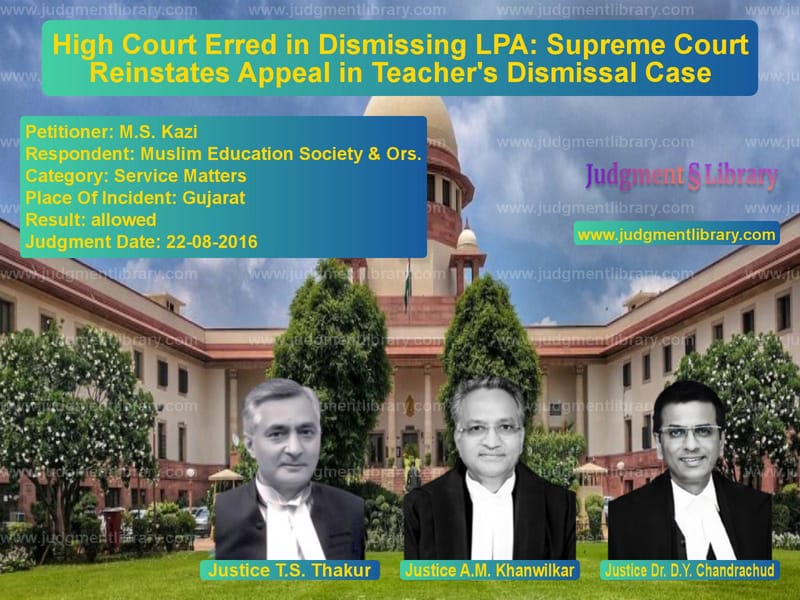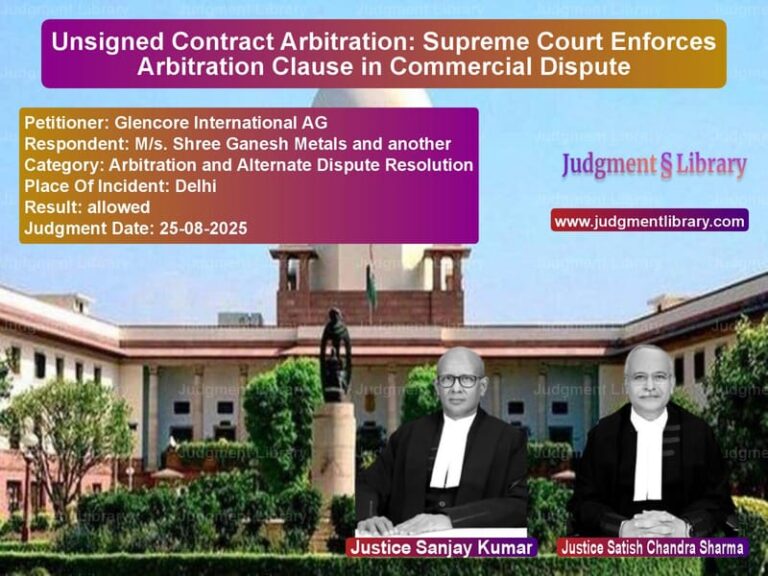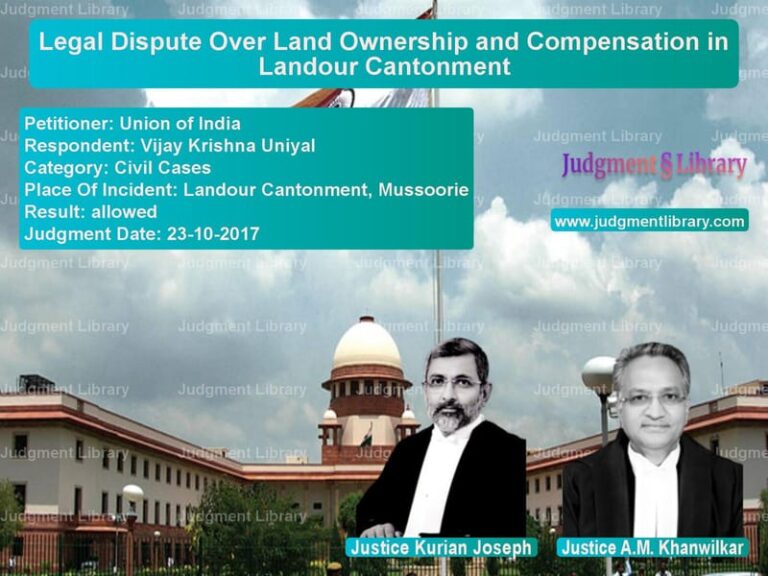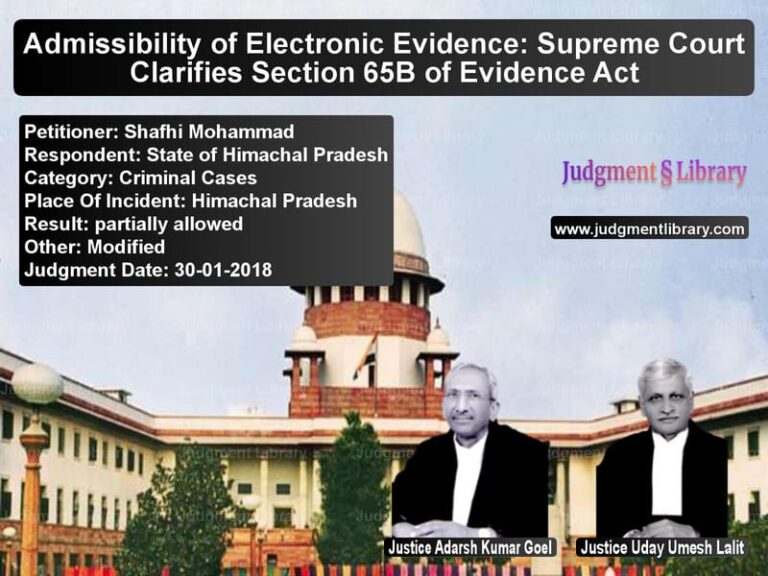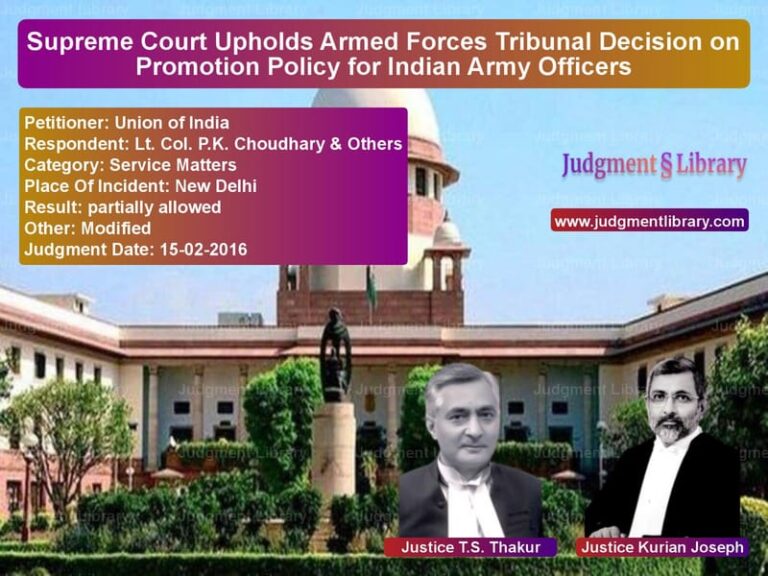High Court Erred in Dismissing LPA: Supreme Court Reinstates Appeal in Teacher’s Dismissal Case
The Supreme Court of India, in the case of M.S. Kazi vs. Muslim Education Society & Ors., ruled on the legality of a High Court’s dismissal of a Letters Patent Appeal (LPA) in a case involving a teacher’s dismissal from service. The ruling clarified the procedural aspects of filing writ petitions and whether a tribunal must be made a party to proceedings under Articles 226 and 227 of the Constitution.
Background of the Case
The appellant, M.S. Kazi, was an Assistant Teacher employed in a school managed by the Muslim Education Society, a minority institution. On June 25, 2002, Kazi was served with a chargesheet alleging that:
- He had proceeded on a pilgrimage between November 29, 2001, and December 15, 2001, without obtaining prior permission.
- He had provided conflicting reasons in different applications—his leave application mentioned Umrah, while his provident fund withdrawal form cited Haj.
After a departmental inquiry, the charges were found to be established, and Kazi was dismissed from service on January 13, 2004. He challenged his dismissal before the Gujarat Higher Secondary Education Tribunal, which upheld the decision on June 13, 2006.
Arguments of the Petitioner (M.S. Kazi)
The appellant challenged his dismissal on the following grounds:
- The charges against him were minor and did not warrant the extreme penalty of dismissal.
- There was no procedural irregularity in his leave application that justified termination.
- The tribunal failed to consider relevant facts and had wrongfully upheld the school’s decision.
- He should be treated as having remained in service until his retirement in October 2005 and be granted pensionary benefits.
Arguments of the Respondents
The school management and the state contended that:
- The appellant had violated service rules by taking unauthorized leave.
- The tribunal’s order was valid, as it had reviewed the facts and upheld the dismissal.
- The High Court correctly dismissed the appellant’s case, as he had not impleaded the tribunal in his Special Civil Application.
High Court’s Judgment
The Gujarat High Court dismissed Kazi’s writ petition under Articles 226 and 227, ruling that it was not maintainable because the tribunal was not made a party to the proceedings. This decision was based on a five-judge bench ruling in Gujarat State Road Transport Corporation vs. Firoze M. Mogal, which held that a writ petition challenging a tribunal’s order must include the tribunal as a party.
Kazi then filed an LPA, which was also dismissed by a Division Bench of the High Court on March 28, 2014, citing the same reasoning.
Supreme Court’s Judgment
The Supreme Court, in a judgment delivered by Chief Justice T.S. Thakur, Justice A.M. Khanwilkar, and Justice Dr. D.Y. Chandrachud, overruled the High Court’s decision. The key findings of the Supreme Court were:
- The tribunal was not a necessary party to the writ proceedings because it was not required to defend its own order.
- The writ petition was maintainable even if the tribunal was not impleaded.
- The High Court erred in dismissing the LPA solely on technical grounds without examining the merits of the case.
- The case was restored to the High Court for disposal on merits.
Judicial Observations
The Supreme Court made several important observations regarding the procedural aspects of filing writ petitions:
1. Tribunals Are Not Always Necessary Parties:
“When a tribunal or authority is required to defend its own order, it is to be made a party, failing which the proceeding before the High Court would be regarded as not maintainable. However, there are tribunals which are not required to defend their own orders, in which case such tribunals need not be arrayed as parties.”
2. Writ Petitions Under Articles 226 and 227:
“An order of the tribunal is capable of being tested in the exercise of judicial review under Articles 226 and 227 of the Constitution. When the remedy is invoked, the tribunal is not required to step into the arena of conflict for defending its order.”
3. High Court’s Erroneous Approach:
“The High Court was in error in dismissing the LPA on the ground that it was not maintainable. Consequently, the judgment and order of the Division Bench dated 28 March 2014 is set aside.”
Impact of the Judgment
1. Clarification on Writ Petition Procedures
The ruling establishes that not all tribunals need to be made parties in writ petitions, thereby preventing unnecessary technical dismissals.
2. Strengthening the Right to Judicial Review
The judgment reinforces the fundamental right to challenge administrative decisions in High Courts without facing procedural roadblocks.
3. Expediting Disciplinary Disputes
The Supreme Court directed the High Court to hear the case expeditiously, recognizing that prolonged litigation harms both employees and employers.
Conclusion
The Supreme Court’s ruling in M.S. Kazi vs. Muslim Education Society & Ors. is a significant decision that clarifies the procedural requirements for filing writ petitions. By reinstating Kazi’s appeal, the Court upheld the principle that technicalities should not obstruct access to justice. The ruling ensures that cases are decided on their merits rather than dismissed due to procedural shortcomings.
Don’t miss out on the full details! Download the complete judgment in PDF format below and gain valuable insights instantly!
Download Judgment: M.S. Kazi vs Muslim Education Soc Supreme Court of India Judgment Dated 22-08-2016-1741878531371.pdf
Direct Downlaod Judgment: Direct downlaod this Judgment
See all petitions in Employment Disputes
See all petitions in Public Sector Employees
See all petitions in Disciplinary Proceedings
See all petitions in Judgment by T.S. Thakur
See all petitions in Judgment by A M Khanwilkar
See all petitions in Judgment by Dhananjaya Y Chandrachud
See all petitions in allowed
See all petitions in supreme court of India judgments August 2016
See all petitions in 2016 judgments
See all posts in Service Matters Category
See all allowed petitions in Service Matters Category
See all Dismissed petitions in Service Matters Category
See all partially allowed petitions in Service Matters Category

